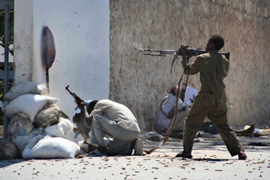Somali leader pledges aid security
Opposition urges halt to attacks on aid workers as government calls for UN force.

Aid groups have scaled down operations in Somalia due to increased insecurity, with at least 2.6 million Somalis facing hunger because of acute food shortfalls spurred by prolonged drought, insecurity and high inflation.
Aweys claimed the leadership of the Alliance for the Re-Liberation of Somalia (ARS), an umbrella opposition group, on Tuesday. He expelled Sheikh Sharif Sheikh Ahmed, a former head of the Union of Islamic Courts, the predominant movement fighting government forces.
UN force needed
His comments came as the foreign minister representing the Transitional Federal Government (TFG) of Somalia asked the UN Security Council for the deployment of a peacekeeping force.
 |
| Opposition forces frequently target the government and Ethiopian troops [EPA] |
“We are hoping that the [UN Security] Council will make a decision in the coming weeks … [and that] the UN will order some kind of international presence, either a peacekeeping force or an international stabilising force,” Ali Ahmed Jama said.
Fighters opposed to the government have carried out roadside bombs, mortar attacks and assassinations against the administration and its Ethiopian allies since early last year.
However, the fighters have blamed government hardliners for the wave of attacks targeting humanitarian staff.
The African Union force currently deployed in Somalia has said is no longer capable of bringing stability to the country and has also called on the UN to help.
The AU mission, known as Amisom, says it lacks funding and logistical support, making it impossible to carry out its mandate on the ground.
Amisom has been in Somalia since March 2007 and is currently made up of 2,600 Ugandan and Burundian troops.
Jama also said that once the UN-brokered truce deal arranged in Djibouti on June 9 by the Somali government and the opposition went into into effect, “we are hoping that violence will go down and a climate conducive to deployment will be created”.
He said he expected the Djibouti accord to be formally signed “within three weeks at the most”.
The Djibouti agreement has been initialed by the Somali transitional government and several top leaders from the main opposition alliance.
However, other leading opposition leaders and military commanders, including Aweys, have rejected it, insisting that Ethiopian troops supporting the Somali government leave before peace talks can start.